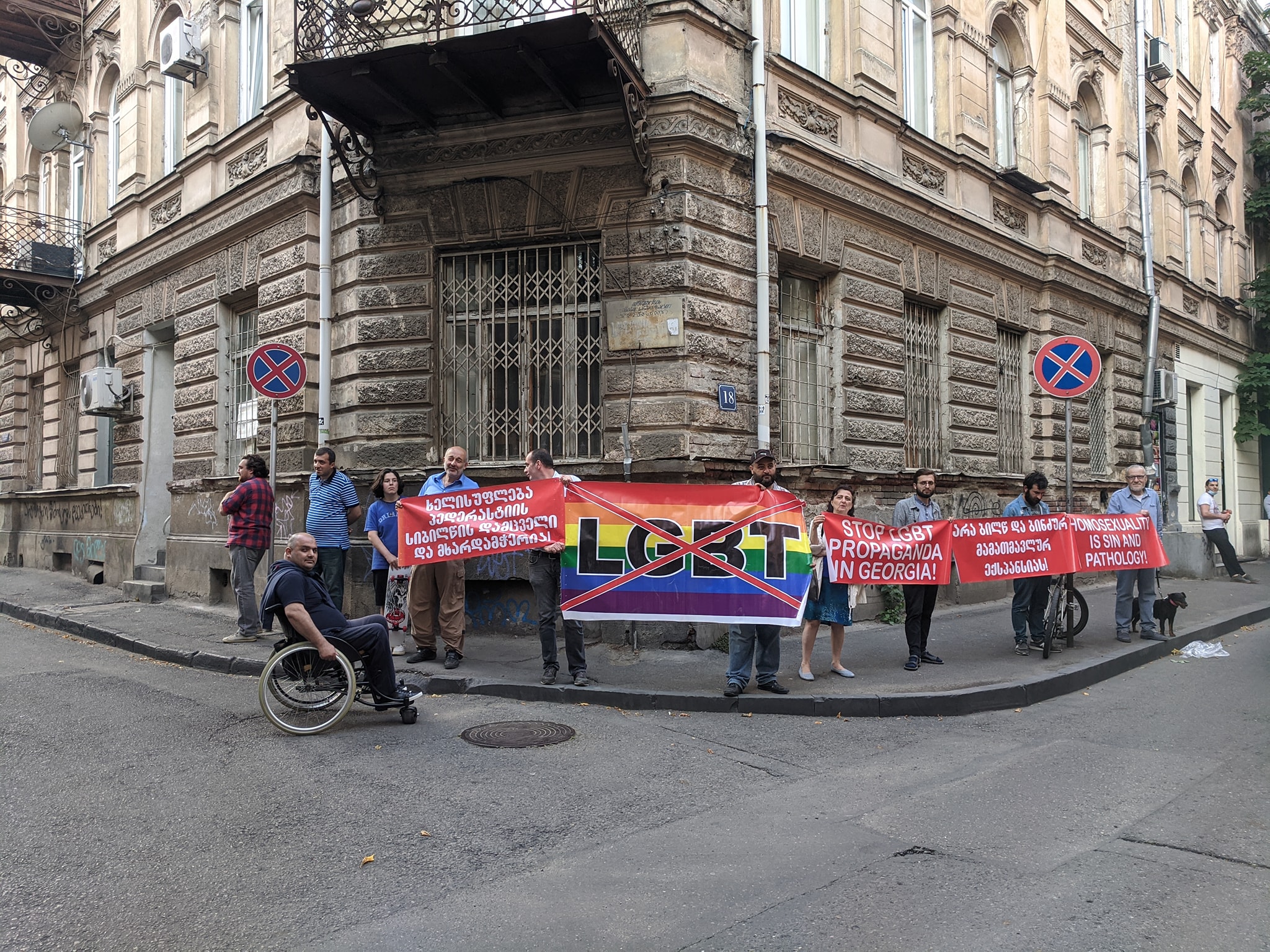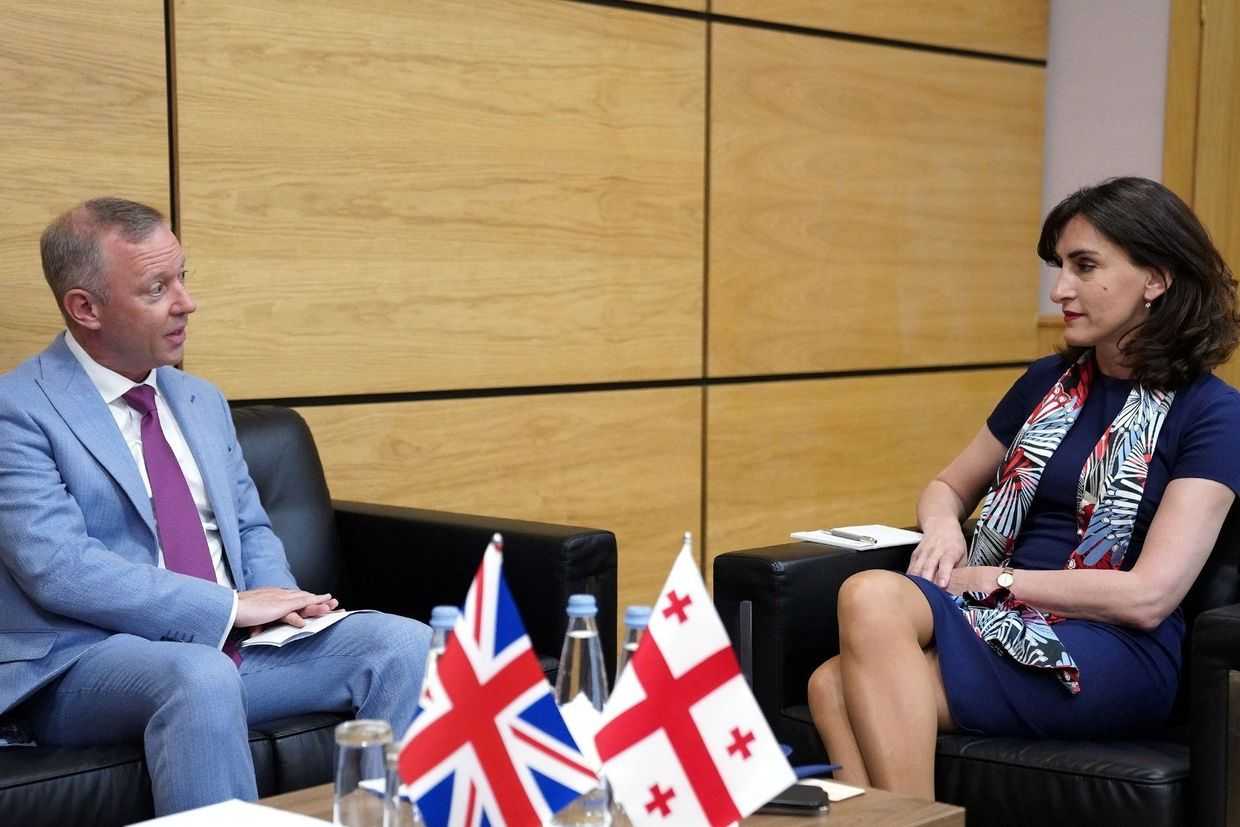
Homophobic protesters have vandalised the exterior of the Tbilisi Pride office, throwing black paint at a rainbow flag hanging from their balcony.
On Sunday, ultraconservative leader Guram Palavandishvili, who organised the protests, posted a video online showing protesters throwing the paint.
The Interior Ministry has launched Administrative proceedings for ‘petty hooliganism’.
Protesters have been gathering daily outside the offices of Tbilisi Pride, a local queer rights organisation, for more than two weeks.
Tamaz Sozashvili, a member of Tbilisi Pride told TV Pirveli on 8 June that the protesters started showing up at their office on 17 May — International Day Against Homophobia, Transphobia, and Biphobia.
He said the group had the right to protest but that this ‘shouldn’t violate other people’s rights’.
‘What has happened is a crime. Not only did they attack private property but they also vandalised a building which has cultural heritage status’, said Sozashvili.
He added that in May, the group had stolen a flag hanging from their third-floor balcony.
Shannon Rudberg, a resident of the building in which Tbilisi Pride rents office, told OC Media that the protesters were making her feel unsafe.

‘I am not anti-protest; I believe in free speech. But, I am not okay with bullying behaviour on my street where I own property’, said Rudberg, adding that her and her neighbours’ safety was being compromised.
She said that despite appealing to the police, she and her partner were told that they were being ‘disruptive’ for trying to take a photograph of the demonstration.
Queer rights going into the 2020 elections
Queer people are one of the most marginalised minority groups in Georgia. According to the 2019 Caucasus barometer survey, 24% of the public reported they would least like a homosexual as a neighbour.
The survey asked people to name the group that they would least like to have as neighbours from a list of different groups, including homosexuals, criminals, people following a different religion, people with different political views, Europeans or Asians who come to live in Georgia and want to stay, and drug addicts.
The usual stand-off between supporters of queer rights and homophobic counter-protesters did not take place this 17 May in Tbilisi, as Georgia marked International Day Against Homophobia, Transphobia, and Biphobia under a state of emergency.
Despite the pandemic, however, ‘blessmobiles’ laden with priests roamed the streets spraying holy water on pedestrians.
In September 2019, the Committee of Ministers of the Council of Europe expressed ‘concern’ over Georgia’s failure to uphold the rights of queer people, including the lack of protection for the aborted Tbilisi Pride march in 2019.
In 2017, Parliament banned gay marriage by defining marriage in the constitution as a ‘union between a man and a woman’. The move came despite same-sex marriage already being expressly forbidden under Georgian law.
The ruling Georgian Dream party came under fire from rights groups over the move for using homophobia as a tool to gain votes.
Few political parties in Georgia have openly supported marriage equality, with many speaking out against it.
On 7 June, leading members of the newly-formed Lelo Party announced that they would not support same-sex marriage.
The party’s founder, Mamuka Khazaradze, said that ‘the rights of minorities are very well protected in Georgia and if there are exceptions, this means that the law is not fulfilled’.
He added that the rights of queer people were sometimes violated, but that this ‘doesn’t mean that minorities should impose their opinion on the majority’.
Davit Usupashvili, a leading member of Lelo, went on to say that the party would not support queer marriage.
‘Because of this, we might look old-fashioned in the eyes of some, but we’ll endure it and they should endure us without all kinds of phobia-name-calling’.
During the 2016 parliamentary elections, the Republican Party, then led by Usupashvili, took the unprecedented step of supporting marriage equality.
Libertarian party Girchi has also supported this.









